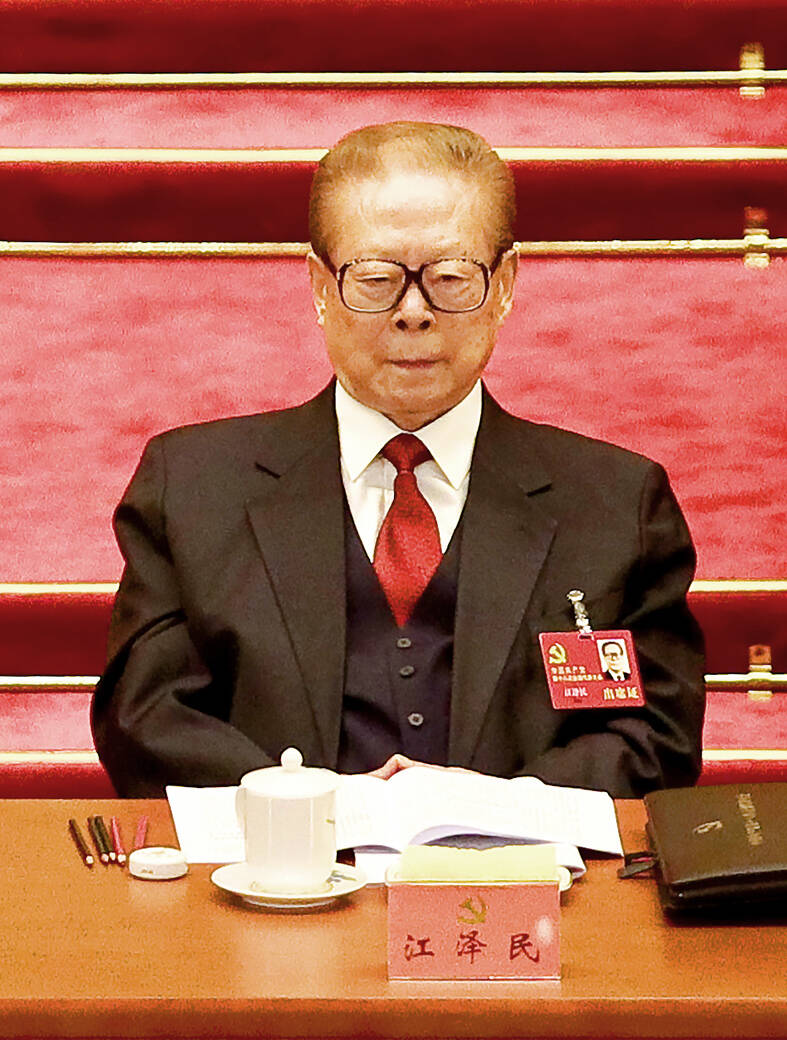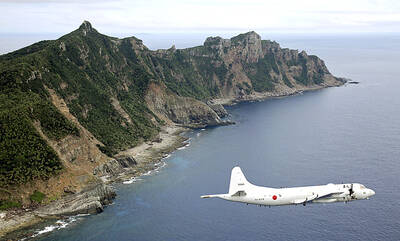Former Chinese leader Jiang Zemin (江澤民) died yesterday, state media reported, hailing him as a great communist revolutionary who helped quell democracy protests in 1989.
He was 96.
Jiang took power in the aftermath of the Tiananmen Square Massacre, in which the military used deadly force to end demonstrations and led China toward its emergence as a global economic powerhouse.

Photo: EPA-EFE
The major bodies of the Chinese Communist Party (CCP) announced his death through a letter that expressed “profound grief.”
“Jiang Zemin passed away due to leukemia and multiple organ failure in Shanghai at 12:13pm on Nov. 30, 2022, at the age of 96, it was announced on Wednesday,” Xinhua news agency said.
His death came after all medical treatments had failed, it added, citing the letter.
“Comrade Jiang Zemin was an outstanding leader ... a great Marxist, a great proletarian revolutionary, statesman, military strategist and diplomat, a long-tested communist fighter, and an outstanding leader of the great cause of socialism with Chinese characteristics,” it said.
Jiang’s death comes amid a flare-up of protests against COVID-19 lockdowns that have morphed into calls for more political freedoms — the most widespread since the 1989 rallies.
When Jiang replaced Deng Xiaoping (鄧小平) in 1989, China was still in the early stages of economic modernization. By the time he retired as leader in 2003, China was a member of the WTO, Beijing had secured the 2008 Olympics and the country was well on its way to superpower status.
Analysts say Jiang and his “Shanghai Gang” faction continued to exert influence over Chinese politics long after he left the top job, including in the selection of Xi Jinping (習近平) as president in 2012.
CCTV said that flags would be flown at half-mast at Chinese government buildings until his funeral, for which a date is not set.

MISINFORMATION: The generated content tends to adopt China’s official stance, such as ‘Taiwan is currently governed by the Chinese central government,’ the NSB said Five China-developed artificial intelligence (AI) language models exhibit cybersecurity risks and content biases, an inspection conducted by the National Security Bureau (NSB) showed. The five AI tools are: DeepSeek, Doubao (豆包), Yiyan (文心一言), Tongyi (通義千問) and Yuanbao (騰訊元寶), the bureau said, advising people to remain vigilant to protect personal data privacy and corporate business secrets. The NSB said it, in accordance with the National Intelligence Services Act (國家情報工作法), has reviewed international cybersecurity reports and intelligence, and coordinated with the Ministry of Justice Investigation Bureau and the National Police Agency’s Criminal Investigation Bureau to conduct an inspection of China-made AI language

LIMITS: While China increases military pressure on Taiwan and expands its use of cognitive warfare, it is unwilling to target tech supply chains, the report said US and Taiwan military officials have warned that the Chinese People’s Liberation Army (PLA) could implement a blockade within “a matter of hours” and need only “minimal conversion time” prior to an attack on Taiwan, a report released on Tuesday by the US Senate’s China Economic and Security Review Commission said. “While there is no indication that China is planning an imminent attack, the United States and its allies and partners can no longer assume that a Taiwan contingency is a distant possibility for which they would have ample time to prepare,” it said. The commission made the comments in its annual

‘TROUBLEMAKER’: Most countries believe that it is China — rather than Taiwan — that is undermining regional peace and stability with its coercive tactics, the president said China should restrain itself and refrain from being a troublemaker that sabotages peace and stability in the Indo-Pacific region, President William Lai (賴清德) said yesterday. Lai made the remarks after China Coast Guard vessels sailed into disputed waters off the Senkaku Islands — known as the Diaoyutai Islands (釣魚台) in Taiwan — following a remark Japanese Prime Minister Sanae Takaichi made regarding Taiwan. Takaichi during a parliamentary session on Nov. 7 said that a “Taiwan contingency” involving a Chinese naval blockade could qualify as a “survival-threatening situation” for Japan, and trigger Tokyo’s deployment of its military for defense. Asked about the escalating tensions

DISPUTE: A Chinese official prompted a formal protest from Tokyo by saying that ‘the dirty head that sticks itself out must be cut off,’ after Takaichi’s Taiwan remarks Four armed China Coast Guard vessels yesterday morning sailed through disputed waters controlled by Japan, amid a diplomatic spat following Japanese Prime Minister Sanae Takaichi’s comments on Taiwan. The four ships sailed around the Senkaku Islands — known as the Diaoyutai Islands (釣魚台) to Taiwan, and which Taiwan and China also claim — on Saturday before entering Japanese waters yesterday and left, the Japan Coast Guard said. The China Coast Guard said in a statement that it carried out a “rights enforcement patrol” through the waters and that it was a lawful operation. As of the end of last month,